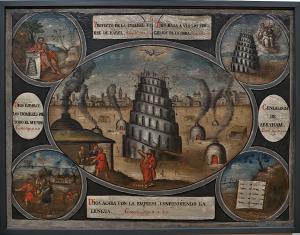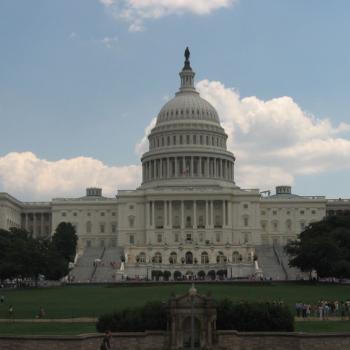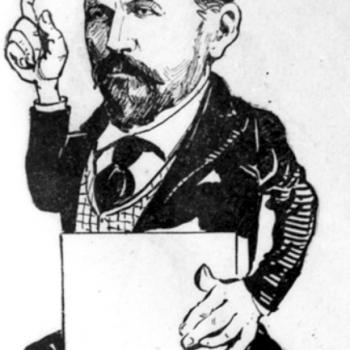
Sin creates confusion as it corrupts and divides up humanity, seeking to destroy (or deconstructing) it from within. Humanity was meant to act together and work as one interdependent whole, but the embrace of sin has brought about the embrace of the ego over and above humanity, so now humanity has been cut up, as it were, into are many “parts,” parts which fight against each other instead of seeing how everyone is best off if they seek after the unity God intended it to have. We were created to be persons in relationship with others, realizing we have no independent existence, but we have instead become individuals, trying to cut ourselves from others, trying to exist in total independence as if we were gods. Thus, we embrace pride, falling further into sin, causing further harm to the unity which humanity is meant to have. The story of the Tower of Babel is, in many respects, a warning against pride: it shows us how, as we cut ourselves from others thanks to our pride, we lose the ability to understand each other. Pride has us reject empathy because empathy shows us how others are our equals, and once we realize that, we deny the foundation which pride needs to thrive. The Christian doctrine of original sin, therefore, is a teaching about the way of sin, about how it corrupts those who are touched by it, and how in and through that corruption, people find themselves more and more at odds with each other, using all kinds of accidental characteristics like gender, their race, or wealth, to justify their own sense of superiority. Christ, in fighting against sin, therefore came to heal the destructive nature of sin, and the way it leads humanity to deny its proper integral unity. Christ shows us the destiny of humanity is to be one, with everyone brought together and united in love, so that they can better reflect the image of God, the image of the Trinity, which was given to humanity in its creation.
Sadly, many Christians have lost sight on the unitive work of Christ. They do not understand what Pentecost shows us: that Christians, filled with the Spirit, are called to do what they can to overcome the divisions and confusion sin created in the human condition. Too many want to keep and reinforce those divisions, if not actually make more of them. They want to promote and engage all kinds of biases and prejudices against others, using them to deny others their human dignity. This is especially evident in those who promote Christian nationalism; they seek to reify various distinctions, such us those associated with borders, or various racial distinctions, and use them to keep humanity divided, allowing them to abuse those who do not fit their preferences. Christian nationalism is not only far from what Christ wanted from Christians, it actively works against Christ, creating more and more barriers in a way which parallels the way original sin created and established division in humanity, as Terry A. Veling explained:
Perhaps nothing comes as close to humanity’s most original sin than its desire to construct borders – borders that determine who is “in” and who is “out,” who belongs and who is outcast – borders that demarcate those who own and possess, and those who are deprived and dispossessed. [1]
This is not to say there cannot be and will not be logical distinctions within humanity, because, of course, they will be. The problem is when those distinctions are absolutized, made essential, and are used to divide up humanity, destroying it underlying unity. It is a problem represented between the difference of a person, who is a relational entity that works in and understands themselves in connection to and interdependent with everyone else, and an individual, someone who thinks they can be and are all they are meant to be apart from everyone else, becoming as it were, a monad with no connection with anyone else. We can, of course, see other logical distinctions in the world, distinctions which have value when not absolutized, but become sinful when they are. This is how we are to understand borders: they have value, as they represent distinctions in the world. But, as Veling says, as a way to make sure we do not abuse them and use them to further erode human unity, they must be be permeable:
If we have to deal with borders, then let’s try at least to make them as open and porous and permeable as possible – especially for people – yes, even for the immigrant and itinerant, but most especially for the poor and the exiled.[2]
Love allows for distinctions, not ones which divide, but ones which allow us to find ways to look at and appreciate each other as we come together as one. Love has us share ourselves with each other, and that is possible only if we are willing to be vulnerable and open ourselves up to others. We will find we are at are best when we are in an interdependent relationship with everyone else, which is why working for the unity of humanity is itself a divine call given to each and every one of us:
As the common possession of a single biological destiny, so also the common possession of the divine call exceeds all historical boundaries and makes men one. This call is always incumbent upon men and constitutes their true dignity, a dignity of such a nature that it makes all distinctions in human ranks and honors seem infinitesimal and trivial.[3]
If we are to live in the light of the resurrection and Pentecost, we must do so by working for the common good, for the betterment of humanity as a whole. We must seek to bring humanity together instead of finding new ways of dividing it up. Everyone is meant to be one with everyone else in and with a bond of love. Those who try to create exceptions, those who find excuses to cut people out of that call, fight against Christ. To do so in the name of Christ is utter blasphemy, a blasphemy which, of course, like every other sin, is a sin which causes its own punishment. Those who resist the divine call for unity, those who seek to divide humanity and do so in Christ’s name, risk finding out Christ saying he does not know them at the time of their eschatological judgment. Christian nationalism, though it is held onto and practiced by those who are Christian, is fundamentally a Satanic ideology, one which has come to possess many Christians; the Christian community needs to do all it can to exorcise that demon, for, the longer it remains, the more it destroys the world around it; as it does so in the name of Christ, those who are not Christian will think it is what Christianity is about and will not want anything to do with Christianity or Christ. Who could blame them?
[1] Terry A. Veling, Practical Theology (Maryknoll, NY: Orbis Books. 2005), 219.
[2] Terry A. Veling, Practical Theology, 219,
[3] Joseph Ratzinger, “The Dogmatic and Ascetical Meaning of Christian Brotherhood” in Man Before God: Toward A Theology of Man. Ed. Dennis Burkhard OFM, Leo A. Connolly, William T. Merten, and Michael G. Steinhauser (New York: P.J. Kenedy & Sons, 1966), 115.
Stay in touch! Like A Little Bit of Nothing on Facebook.
If you liked what you read, please consider sharing it with your friends and family!
N.B.: While I read comments to moderate them, I rarely respond to them. If I don’t respond to your comment directly, don’t assume I am unthankful for it. I appreciate it. But I want readers to feel free to ask questions, and hopefully, dialogue with each other. I have shared what I wanted to say, though some responses will get a brief reply by me, or, if I find it interesting and something I can engage fully, as the foundation for another post. I have had many posts inspired or improved upon thanks to my readers.












